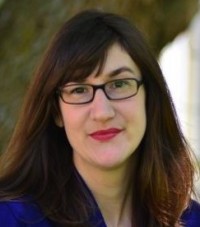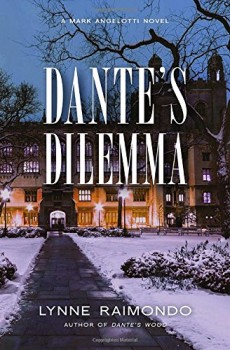Dante’s Dilemma by Lynne Raimondo
Lynne Raimondo’s debut, Dante’s Wood, introduced readers to blind psychiatrist Mark Angelotti. The book was a Library Journal Mystery Debut of the Month and earned Raimondo comparisons to Agatha Christie, John Grisham, and Sara Paretsky. Her second book, Dante’s Poison, has Mark investigating the pharmaceutical industry as he undergoes experimental drug therapy. DANTE’S DILEMMA, released last month, turns up the heat on Mark’s personal and professional life.
In DANTE’S DILEMMA, Mark is asked to evaluate Rachel Lazarus, estranged wife of a slain University of Chicago professor. The professor’s body was discovered during the school’s world-famous annual scavenger hunt. Though she’s confessed, Rachel is pursuing a battered woman’s defense. Mark must testify against Rachel while he’s mired in a legal dispute of his own for custody of his son. He then uncovers evidence that Rachel may be innocent after all. In the midst of a brutal Chicago winter, Mark must battle the elements, the ghosts of his past, and a killer intent on making sure Rachel is found guilty.
I recently got a chance to talk to Lynne about DANTE’S DILEMMA.
DANTE’S DILEMMA is the third in your Mark Angelotti series. Are the books easier to write as you delve further into the series? Or are their limits to writing a series book?
A little bit of both. The character is certainly easier. At this point, I have a fairly good idea of how my protagonist will think and act, and I’ve sketched out a character arc for Mark that spans several installments into the future. The hard part for me is plotting the mystery and overcoming my perfectionist tendencies. I can’t move ahead in a manuscript until I’m 80 percent satisfied with what I’ve written so far, so I sometimes get stuck polishing scene after scene when I should just be getting the damn thing done! The challenge of writing a series is including enough backstory so that a reader can understand where the character has been, and at the same time not give everything away. Each book should stand on its own, but ideally entice someone new to the series to go back and read earlier books.
This book tackles the world of academia, a world with its own with its rites and history. Have you worked at a university? What about university culture appealed to you in terms of setting and plot?
I have not worked at a university except for a semester as an adjunct professor teaching trial practice. What appealed to me about university culture, especially at institutions like the University of Chicago, is the atmosphere of intense intellectual competition. It’s essentially a small town where everyone wants to be recognized as the greatest in their field–the perfect setup for murder. Universities are also the places where the social issues of the day are constantly being debated, something I tried to work into DANTE’S DILEMMA. Two of my kids got their undergraduate degrees at U of C, and I spent a year as a visiting student at the Law School, so I felt fairly comfortable describing that atmosphere, though of course everything in DANTE’S DILEMMA is made up. And from a purely physical standpoint, the U of C campus is a great locale for skullduggery, filled with all the gothic touches that have inspired its student nickname of “Hogwarts.”
Mark has an evolving relationship with lawyer Hallie Sanchez in your first two novels. Does Hallie make an appearance in the third?
You bet, though at the beginning of DANTE’S DILEMMA they’re on the outs after Mark has finally worked up the nerve to tell Hallie about his checkered past. Then, to make matters worse, Mark is forced into helping the prosecution in a case where Hallie represents the defendant. This was my nod to Adam’s Rib and I had a lot of fun with it. I won’t say how it all turns out, but a development near the end of the book may put a further strain on their relationship. This is another one of the challenges of writing a series. Readers want to see a romance blossom, but the suspense is destroyed if it happens too quickly. To use an example from television, one of the reasons The X-Files was such a huge success was because the writers kept viewers guessing about whether Mulder and Scully would ever get together. I loved that aspect of the show and have tried to import some of the same tension into Mark and Hallie’s relationship.
You do an excellent job of portraying Mark’s blindness in an organic way that feels genuine. How did you research his condition? As a writer how do you “filter out” the visual from Mark’s narrative?
I read a lot. Really a lot. Autobiographies, academic papers, blogs–whatever I could find that would give me insight into the physical, emotional and social challenges faced by people with disabilities. And of course a great deal of medical literature on Mark’s condition, a real-life genetic disorder called Leber’s Hereditary Optic Neuropathy for which there is presently no cure. Along the way I discovered the many technological advances, like screen readers and smartphone apps, that have literally revolutionized life for the blind in recent years, and that Mark makes full use of when he is investigating crimes. I don’t make any of this stuff up, and I think it adds something special and different to the books. Filtering out the visual is hard for me, but I also enjoy finding other ways to engage readers, such as what Mark perceives with his other senses, and how he describes himself. His voice and personality have to carry a lot of the weight in these books.
Mark’s relationship to his young son is at the crux of DANTE’S DILEMMA in the form of a custody case. As a lawyer, did you ever handle family law? If not, did you enjoy practicing a form of law you hadn’t tried in real life?
Family law is something I never wanted to touch. I would have found it too emotionally draining. For the same reason, I didn’t dip into criminal law until it was forced on me mid-career when the firm I was working for was indicted by the federal government. Before then, I felt more comfortable handling civil cases, where most of the time the only thing at stake for either side is money. Being responsible for someone else’s freedom is a much more daunting proposition. But yes, it’s absolutely true that one of the things I enjoy about writing the series is vicariously handling the kind of cases I didn’t try in real life.
What’s your writing process like? Do you outline first?
I can’t outline. I’ve tried and it’s just not my thing, partly because I have a short attention span. If I know everything that’s going to happen in a story, I get bored and stop writing. Much more exciting for me is not knowing exactly how things will end up. I usually start with an idea about the victim and the way they were murdered, even if I’m not completely sure about whodunit or why. As I write the motives and behavior of the various players begin to take shape, though the characters sometimes head off in directions that surprise me. The downside of this process is that it’s often terrifying. Until I type “The End” on a manuscript I’m never really comfortable that I can pull it off.
What’s next for you?
I just sold the fourth book in the Mark Angelotti series, tentatively titled Dante’s Regret, to Seventh Street Books. Mark is temporarily back on the East Coast preparing for the hearing in his custody battle when he receives a summons from an old friend, Giorgio Ferraris, who along with Mark’s father was an Italian POW in the United States during World War II. Well into his nineties, nobody expects Ferraris to live forever, but Mark is shocked when Ferraris dies suddenly, right after giving Mark a diary written by his father describing their wartime experiences. Mark sets out to investigate Ferraris’ death, only gradually discovering that the diary holds a dangerous secret — one that will plunge him into a cat and mouse game with a ruthless killer at the same time he is fighting for the right to raise his son.
*****
 Lynne Raimondo is the author of Dante’s Wood (Seventh Street Books, 2013), described as “stunning” and “one of the best mystery debuts since V.I. Warshawski solved her first case” by Mystery Scene and “a real keeper” by Library Journal (starred review and mystery debut of the month), and Dante’s Poison (Seventh Street Books, 2014). Before turning to writing, Lynne was a partner at a major Chicago law firm, the general counsel of Arthur Andersen LLP, and the general counsel of the Illinois Department of Revenue.
Lynne Raimondo is the author of Dante’s Wood (Seventh Street Books, 2013), described as “stunning” and “one of the best mystery debuts since V.I. Warshawski solved her first case” by Mystery Scene and “a real keeper” by Library Journal (starred review and mystery debut of the month), and Dante’s Poison (Seventh Street Books, 2014). Before turning to writing, Lynne was a partner at a major Chicago law firm, the general counsel of Arthur Andersen LLP, and the general counsel of the Illinois Department of Revenue.
 Stephanie Gayle’s mystery, Idyll Threats, earned a starred review from Booklist. Her first novel, My Summer of Southern Discomfort, was chosen as one of Redbook’s Top Ten Summer Reads. Her short fiction and non-fiction have appeared in Kenyon Review Online, The Potomac Review, Punchnel‘s, and other publications. She’s twice been nominated for a Pushcart Prize. She co-founded the popular Boston reading series, Craft on Draft.
Stephanie Gayle’s mystery, Idyll Threats, earned a starred review from Booklist. Her first novel, My Summer of Southern Discomfort, was chosen as one of Redbook’s Top Ten Summer Reads. Her short fiction and non-fiction have appeared in Kenyon Review Online, The Potomac Review, Punchnel‘s, and other publications. She’s twice been nominated for a Pushcart Prize. She co-founded the popular Boston reading series, Craft on Draft.
Photography credit: Sayamindu Dasgupta
- LAST GIRL MISSING with K.L. Murphy - July 25, 2024
- CHILD OF DUST with Yigal Zur - July 25, 2024
- THE RAVENWOOD CONSPIRACY with Michael Siverling - July 19, 2024

